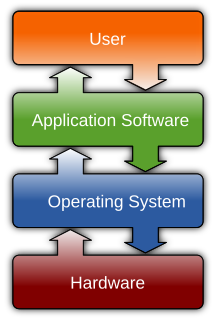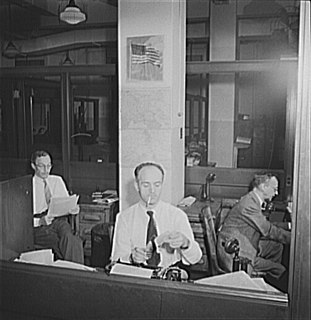A total market coverage, or TMC, is a piece of advertising that reaches all households in a market. Traditionally in most of North America newspapers provided total market coverage, as almost all households would subscribe to the main local paper. As subscription rates have fallen total market coverage products have emerged as a separate project, sometimes administered by newspapers, and sometimes separate businesses known as pennysavers or shoppers. [1]

Advertising is a marketing communication that employs an openly sponsored, non-personal message to promote or sell a product, service or idea. Sponsors of advertising are typically businesses wishing to promote their products or services. Advertising is differentiated from public relations in that an advertiser pays for and has control over the message. It differs from personal selling in that the message is non-personal, i.e., not directed to a particular individual. Advertising is communicated through various mass media, including traditional media such as newspapers, magazines, television, radio, outdoor advertising or direct mail; and new media such as search results, blogs, social media, websites or text messages. The actual presentation of the message in a medium is referred to as an advertisement, or "ad" or advert for short.
A pennysaver is a free community periodical available in North America that advertises items for sale. Frequently pennysavers are actually called The Pennysaver. It usually contains classified ads grouped into categories. Many pennysavers also offer local news and entertainment, as well as generic advice information, various syndicated or locally written columns on various topics of interest, limited comics and primetime TV listings.
Today many newspapers will distribute a supplement to free of charge to all households in the paper's market or a specific portion or portions of the market. Total Market Coverage products are meant to attract readers to subscribe or purchase copies of the main newspaper and also provide an additional outlet for advertisers. First appeared with the Dallas Morning News after long time employee Donald Ray Balser came up with the concept and led a large sales team which would become very successful. Some newspapers only deliver the TMC product to non-subscribers. This is accomplished using software that compares the newspaper's subscriber list to residential records, eliminating any duplicates. Some newspapers also choose to insert the TMC inside newspapers delivered to subscribers or sold at newsstands. TMCs are either mailed using special postal rates or delivered by newspaper carriers or motor route driver

A market is one of the many varieties of systems, institutions, procedures, social relations and infrastructures whereby parties engage in exchange. While parties may exchange goods and services by barter, most markets rely on sellers offering their goods or services in exchange for money from buyers. It can be said that a market is the process by which the prices of goods and services are established. Markets facilitate trade and enable the distribution and resource allocation in a society. Markets allow any trade-able item to be evaluated and priced. A market emerges more or less spontaneously or may be constructed deliberately by human interaction in order to enable the exchange of rights of services and goods. Markets generally supplant gift economies and are often held in place through rules and customs, such as a booth fee, competitive pricing, and source of goods for sale.

Computer software, or simply software, is a collection of data or computer instructions that tell the computer how to work. This is in contrast to physical hardware, from which the system is built and actually performs the work. In computer science and software engineering, computer software is all information processed by computer systems, programs and data. Computer software includes computer programs, libraries and related non-executable data, such as online documentation or digital media. Computer hardware and software require each other and neither can be realistically used on its own.
Different newspapers take different approaches to TMC products. Some are quite simple and even border on low-quality, while others are quite complex. Typically, a TMC product is rather small - perhaps 4 to 12 pages frequently with several pre-printed inserts. Many newspapers use syndicated news stories to fill these pages, But sometimes it is just a mailer with ads and no content. Some newspapers choose to focus on entertainment news while others include local or national news. However, most of the content is either syndicated or reprinted from the main newspaper; very rarely will a newspaper generate original content for a TMC product. Common names for TMC products include "Extra", "MVP" and "Plus". Often the newspaper will tack on one of these words to its main publication's title and use that as its name. For example, the Anytown Tribune might call its TMC product the "Anytown Tribune Plus" or "Anytown Tribune Extra." On the other hand, some newspapers develop entirely different names for their TMC products and may exclude or downplay their own name for fear their name might strike a negative chord with non-subscribers.

Print syndication distributes news articles, columns, political cartoons, comic strips and other features to newspapers, magazines and websites. The syndicates offer reprint rights and grant permissions to other parties for republishing content of which they own and/or represent copyrights. Other terms for the service include a newspaper syndicate, a press syndicate, and a feature syndicate.
TMC products often feature special promotions aimed specifically at non-subscribers, offering special rates for subscribing or other special offers. Most newspapers sell advertising in the TMC product. Usually businesses who advertise in the main publication can add an advertisement in the TMC product for a small additional fee, often just a few dollars per column inch, or purchase an advertisement just in the TMC.
In marketing, promotion refers to any type of marketing communication used to inform or persuade target audiences of the relative merits of a product, service, brand or issue. The aim of promotion is to increase awareness, create interest, generate sales or create brand loyalty. It is one of the basic elements of the market mix, which includes the four Ps, i.e., product, price, place, and promotion.
A column inch was the standard measurement of the amount of content in published works that use multiple columns per page. A column inch is a unit of space one column wide by one inch high.
TMCs were quite popular in the newspaper industry for several years and were seen as an innovative way to reach non-subscribers (and to offer services that compete with direct mail companies). However, some newspapers have begun questioning the effectiveness of TMCs and are doing away with them or cutting back significantly. Many residents dislike TMC products because of their low quality and the fact they don't wish to have any newspaper delivered to their homes. Often these residents call newspapers and ask the product not be delivered to their home. Most newspapers will honor this request. Another problem with delivering a TMC product is, because of their small size, they can easily blow away in the wind, especially if the intended recipients don't bring them inside. There have been some cases of newspapers being accused of littering as a result of TMC products being found scattered around outdoors.

Litter consists of waste products that have been disposed of improperly, without consent, at an undesirable location. Litter can also be used as a verb. To litter means to drop and leave objects, often man-made, such as aluminum cans, cardboard boxes or plastic bottles on the ground, and leave them there indefinitely or for others to dispose of as opposed to disposing of them properly.




